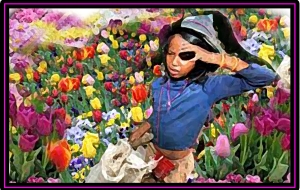Short film: Ilha das Flores by filmmaker Jorge Furtado
Jorge Furtado, a filmmaker from Rio Grande do Sul, directed features such as: There Was Once Two Summers, The Man Who Copied, My Uncle Killed a Guy.
In 1989 he presented one of his most awarded works, the short film Ilha das Flores, with titles such as the best short film in Gramado Festival, 1989; Silver Bear, nineteen ninety; best Brazilian short film in Air France awards, 1990; Silver Daisy Award, 1990.
Ilha das Flores by Jorge Furtado describes the stages that food goes through, represented by the tomato, from its production to its final destination. During each stage, it points out values and judgment attributed by human beings that culminated in the fate of these foods.
The short film shows how the differences between food and waste are linked by values believed by people, designating when a food is appropriate for consumption or not. While a middle-class family classifies a tomato as garbage, this same vegetable is considered food by other families of people and animals.
Furtado reports how human beings and animals are segregated and placed at different hierarchical levels, in which the highest levels have the rights to decide in a more comprehensive way whether a tomato is food or waste; the average levels are resigned to the choice of the higher levels, being able to decide whether their waste is food or not and finally every living being in the lower levels is subject to the remains rejected by the previous levels.
There are two main factors that govern this segregation, firstly financial condition, secondly private property.
The highest levels are occupied by people with the financial resources to purchase food; the median levels are assigned to everything that is property of people with financial resources, in the case of the short, pigs, so their rights are related to the will of their owners; The lowest levels include everything that does not have an owner or money, in this case the residents of Ilha das Flores, who do not have money or owners to guarantee any rights over the tomatoes.
Furtado throughout the short highlights the idea that, although human beings are endowed with a unique ability to understand, analyze and comprehend logical facts, added to a privileged motor capacity, which enabled a series of achievements in which they improved their life conditions. Even so, there is an overvaluation of money and private property that leads to actions that result in segregation between individuals of the same species.
In the short film, there is a strong message against waste. We, privileged human beings at the highest levels of this hierarchy, must increase our awareness regarding waste, in order to realize that our waste feeds this segregation, being a consequence of our habits. We must start thinking that every tomato, lettuce, carrot, fruit, vegetable, food that we throw in the trash could feed another human being, just like us, with a brain and an opposable thumb.
Now watch the short at: [youtube=http://youtu.be/Hh6ra-18mY8]



